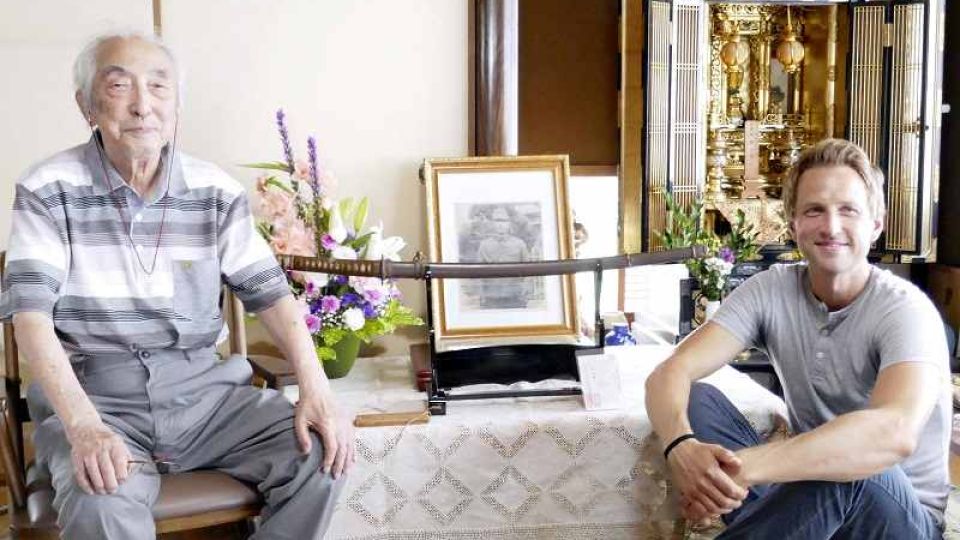July 5, 2022
TOKYO — A Japanese sword belonging to a soldier of the Imperial Japanese Army was handed over to his surviving family members in Nichinan, Miyazaki Prefecture, on Saturday after being stored in a house in the United States for more than 70 years.
Kevin Chroust, a 38-year-old journalist, brought the sword to the soldier’s son. Chroust’s grandfather, Joseph Kasser, 99, obtained the sword and brought it back to the United States when he was a soldier in the U.S. Army.
Chroust had taken over his grandfather’s vow to return the sword and was finally able to find its rightful owner. By handing over the sword, he fulfilled the vow.
According to Chroust, in 1945 just after the end of World War II, Kasser found the sword in piles of Japanese weapons on a beach on Okinawa’s main island.
On a wooden plate tied to the sword with a string, the owner’s name and the name of a town — Takaharu, Miyazaki Prefecture — were written in the English alphabet. A message in English, also on the plate, read, “I am very glad to have the honour to ask your favour to send my sword to my home.”

The Yomiuri Shimbun
A message, apparently written by Tomesuke Umeki, on a wooden plate tied to the sword
Kasser brought the sword home, determined to search for the owner and deliver it to him, because he believed the sword to be very important to this Japanese soldier.
Chroust had heard about the episode with the sword from his grandfather since his childhood. Last year, Chroust sought the help of a Japanese reporter with the Asahi Shimbun, whom he became acquainted with through reporting on U.S. Major League baseball.
The town government of Takaharu was contacted about the sword, and officials of the town government found the owner.
That owner was Tomesuke Umeki, who died at 74 in 1974. According to his relatives, he was on Jeju Island in South Korea when the war ended. It is not known why the sword was found in Okinawa Prefecture.
On July 2, Chroust visited the home of Takemitsu Umeki, 96, son of Tomesuke, and placed the sword in the room of the house where deceased family members are enshrined.
They also talked online with Kasser, who is in Chicago. Members of the two families shared the joy of the sword’s return.
Kasser said that previously it was not easy even to communicate between Japan and the United States, and so he was very glad that this moment had been made possible.
Takemitsu said: “It must have been so hard [to store the sword] for such a long time. I feel a deep gratitude for his having done so.”
Kasser had hoped to hand over the sword to someone who was once an enemy soldier. He had told Chroust that the two just happened to be born “on different sides of the world.”
Chroust said he learned from his grandfather the importance of the view that “history has two sides” and that people need to listen to each other’s opinions, overcoming national borders and personal viewpoints.
In the future, Chroust wants to visit Okinawa Prefecture and other related places to gather more information, make a record of the history of the sword and the two families, and contribute an article about the story to a U.S. magazine.

